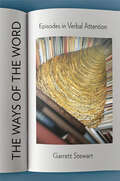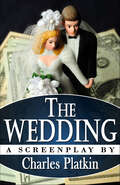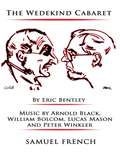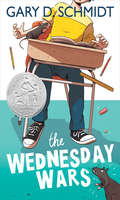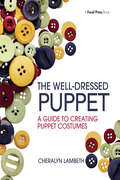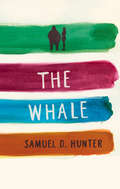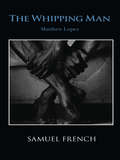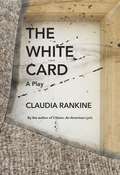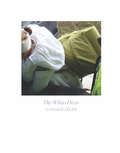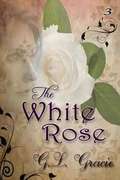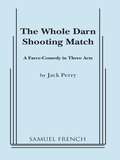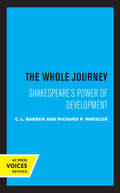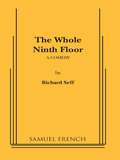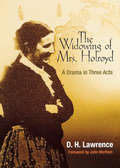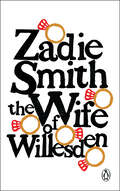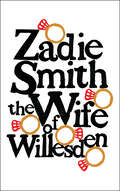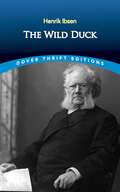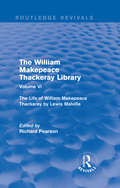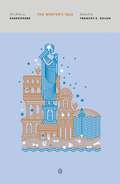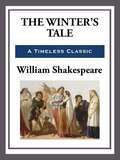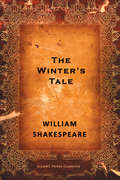- Table View
- List View
The Ways of the Word: Episodes in Verbal Attention
by Garrett StewartIn The Ways of the Word, Garrett Stewart steps aside from theory to focus on the sheer pleasure of attentive reading and the excitement of recognizing the play of syllables and words upon which the best literary writing is founded. Emerging out of teaching creative writing and a broader effort to convene writers and critics, Stewart's "episodes in verbal attention" track the means to meaning through the byways of literary wording.Through close engagement with literary passages and poetic instances whose imaginative demands are their own reward, Stewart gathers exhibits from dozens of authors: from Dickinson, Dickens, and DeLillo to Whitman, Woolf, and Colson Whitehead. In the process, idiom, tense, etymology, and other elements of expressive language and its phonetic wordplay are estranged and heard anew. The Ways of the Word fluidly and intuitively reveals a verbal alchemy that is as riveting as it is elusive and mysterious.
The Wedding: A Screenplay
by Charles PlatkinTwentysomething New Yorkers and lifelong friends Halley and Tim have spent their entire lives living at home and avoiding responsibility at all costs. When their parents finally have had enough and turn them loose on the world to fend for themselves, the two suddenly find themselves being forced to deal with odd jobs and cockroach-infested apartments. Desperate for their old, comfortable lives, Halley and Tim devise what they think is the perfect plan to get back into the good graces of their parents.A four-act screenplay from author Charles Platkin, THE WEDDING is a humorous look at two lives of Generation Y, as they go from pampered to paupers.
The Wedekind Cabaret
by Eric BentleyTranslated and adapted by Eric Bentley / Music by Arnold Black, William Bolcom, Lucas Mason, and Peter Winkler / Flexible casting, 1m., 1f. or expanded to more actors as needed /Musical Revue / A first draft of this entertainment was produced at The Ballroom in New York City in 1994, starring Alvin Epstein and directed by Isaiah Sheffer. Howard Kissel, Daily News, commented: "Bentley's pungent translations of Wedekind's lyrics have been set deftly by three composers, Arnold Black, William Bolcom and Peter Winkler... Tingle Tangle [as the work was then called] is well performed and invariably fascinating." For the Wedekind renaissance of the 21st century Eric Bentley has re-arranged the material and added to it. The piece now consists of two cabaret programs which could be performed together in one long evening or separately. The first program is framed by two Bentley ballads telling the stories of Spring's Awakening and The First Lulu, respectively. Within that frame is a varied series of Wedekind songs and spoken poems. The second program is framed by two Wedekind short stories, neither of them ever before presented on an American (or any other) stage. Within this second frame come poems and songs in which we meet another Wedekind, a wild poet who also had a tender, even elegiac side. The two-part show ends with a song by Eric Bentley and Arnold Black which celebrates, not Wedekind the rebel, but Wedekind the artist.
The Wednesday Wars
by Gary D. SchmidtIn this Newbery Honor-winning novel, Gary D. Schmidt offers an unforgettable antihero. The Wednesday Wars is a wonderfully witty and compelling story about a teenage boy’s mishaps and adventures over the course of the 1967–68 school year in Long Island, New York.<P><P> Meet Holling Hoodhood, a seventh-grader at Camillo Junior High, who must spend Wednesday afternoons with his teacher, Mrs. Baker, while the rest of the class has religious instruction. Mrs. Baker doesn’t like Holling—he’s sure of it. Why else would she make him read the plays of William Shakespeare outside class? But everyone has bigger things to worry about, like Vietnam. His father wants Holling and his sister to be on their best behavior: the success of his business depends on it. But how can Holling stay out of trouble when he has so much to contend with? A bully demanding cream puffs; angry rats; and a baseball hero signing autographs the very same night Holling has to appear in a play in yellow tights! As fate sneaks up on him again and again, Holling finds Motivation—the Big M—in the most unexpected places and musters up the courage to embrace his destiny, in spite of himself.
The Well-Dressed Puppet: A Guide to Creating Puppet Costumes
by Cheralyn LambethCostumes are an integral part of any performance, adding believability, conveying setting, or establishing the tone, a fact that is no less true when your performer is a puppet! The only book of its kind, The Well-Dressed Puppet will show you how to create costumes and accessories tailored specifically for your puppet that will enhance any performance. Gone are the days of ill-fitting store-bought clothing that restrict the movement and use of your puppet. Author Cheralyn Lambeth walks you through every step of the costume-making process with detailed lists of the necessary materials, equipment, and patterns required to create a costume from scratch. She also shares multiple tips and information on how to modify off-the-rack clothing to fit any puppet. Suitable for both beginners and more advanced costumers, The Well-Dressed Puppet demonstrates basic sewing and construction techniques while still providing advanced projects for customers who have already mastered those skills.
The Whale / A Bright New Boise
by Samuel D. HunterAcclaimed for his gentle, complex characterizations, Hunter's big-hearted, fiercely funny plays explore the quiet desperation running through many Middle American lives: The Whale tells the story of a man's last chance at redemption and of discovering beauty in the most unexpected places, and A Bright New Boise is a philosophical investigation of faith and search for meaning in rural Idaho.
The Whipping Man
by Matthew LopezDrama / Characters: 3 male It is April, 1865. The Civil War is over and throughout the south, slaves are being freed, soldiers are returning home and in Jewish homes, the annual celebration of Passover is being celebrated. Into the chaos of war-torn Richmond comes Caleb DeLeon, a young Confederate officer who has been severely wounded. He finds his family's home in ruins and abandoned, save for two former slaves, Simon and John, who wait in the empty house for the family's return. As the three men wait for signs of life to return to the city, they wrestle with their shared past, the bitter irony of Jewish slave-owning and the reality of the new world in which they find themselves. The sun sets on the last night of Passover and Simon - having adopted the religion of his masters - prepares a humble Seder to observe the ancient celebration of the freeing of the Hebrew slaves from Egypt, noting with particular satisfaction the parallels to their current situation. But the pain of their enslavement will not be soothed by this tradition, and deep-buried secrets from the past refuse to be hidden forever as the play comes to its shocking climax. The Whipping Man is a play about redemption and forgiveness, about the lasting scars of slavery, and the responsibility that comes with freedom. "A mesmerizing drama." - Peter Filichia, Newark Star-Ledger "A cause for celebration. Mathew Lopez has come as close as any author could to producing a microcosm of the genesis of a wide range of today's Black American males." - Bob Rendell, Talkin' Broadway "I can see why director Lou Bellamy chose this play for Penumbra, whose most famous alumnus is playwright August Wilson. In its complex welter of issues, in its interior explorations...The Whipping Man is Wilsonian." - Rohan Preston, Minneapolis Star-Ledger "Succeeds with an uncanny maturity in using sharply drawn characters and rich metaphor to wrestle Wilson-like with epic American issues of race, religion, and responsibility. Someone must succeed Wilson; it might as well be Lopez" - Tim Gihring, Minnesota Monthly
The White Card: A Play
by Claudia RankineA play about the imagined fault line between black and white lives by Claudia Rankine, the author of CitizenThe White Card stages a conversation that is both informed and derailed by the black/white American drama. The scenes in this one-act play, for all the characters’ disagreements, stalemates, and seeming impasses, explore what happens if one is willing to stay in the room when it is painful to bear the pressure to listen and the obligation to respond.—from the introduction by Claudia RankineClaudia Rankine’s first published play, The White Card, poses the essential question: Can American society progress if whiteness remains invisible?Composed of two scenes, the play opens with a dinner party thrown by Virginia and Charles, an influential Manhattan couple, for the up-and-coming artist Charlotte. Their conversation about art and representations of race spirals toward the devastation of Virginia and Charles’s intentions. One year later, the second scene brings Charlotte and Charles into the artist’s studio, and their confrontation raises both the stakes and the questions of what—and who—is actually on display.Rankine’s The White Card is a moving and revelatory distillation of racial divisions as experienced in the white spaces of the living room, the art gallery, the theater, and the imagination itself.
The White Dress
by Nathalie LégerThe third in Nathalie Léger&’s acclaimed genre-defying triptych of books about the struggles and obsessions of women artists. The White Dress is the third in Nathalie Léger's award-winning triptych of books about women who &“through their oeuvre, transform their lives into a mystery&” (ELLE). In Exposition, Léger wrote about the Countess of Castiglione, the most photographed woman of the nineteenth century; in Suite for Barbara Loden she took up the actress and filmmaker Barbara Loden; here, Léger grapples with the tragic 2008 death of Italian performance artist Pippa Bacca, who was raped and murdered while hiking from Italy to the Middle East in a wedding dress to promote world peace. A harrowing meditation on the risks women encounter, in life and in art, The White Dress also brings to a haunting conclusion Léger's personal interrogation—sustained across all three books—of her relationship with her mother and the desire for justice in our lives.
The White Rose
by Lillian Garrett-GroagThe White Rose was written by Lillian Garrett-Groag and premiered in 1991 at the Old Globe Theatre in San Diego, Calif. The play chronicles the arrest, interrogation and eventual execution of a group of University of Munich students who protested the Nazi regime at the height of World War II.
The Whole Darn Shooting Match: A Farce-Comedy in Three Acts
by Jack PerryZany exploits, hilarious antics and wild ideas follow fast and furiously throughout this comedy about the advertising world. It is set in the Creative Room where a flamboyant TV commercial writer, an alcoholic artist, a flippant girl Friday, and their beloved leader, the Creative Director, engage in a running feud with the new president of the company, an efficiency expert, the office boy and everyone else who dares to interfere with their off beat rules of office conduct.
The Whole Journey: Shakespeare's Power of Development
by C. L. Barber Richard P. WheelerThis title is part of UC Press's Voices Revived program, which commemorates University of California Press’s mission to seek out and cultivate the brightest minds and give them voice, reach, and impact. Drawing on a backlist dating to 1893, Voices Revived makes high-quality, peer-reviewed scholarship accessible once again using print-on-demand technology. This title was originally published in 1986.
The Whole Ninth Floor
by Richard SeffComedy / 6m, 5f / Interior / Across the street from the ‘mad men’ of Madison Avenue live the Ten Percenters of the National Talent Agency. It’s the same time, 1962, a secretary is still a toy, boys will still be boys, but the times they are a changin’. Audiences will love to hear what’s happening on The Whole Ninth Floor / “First impression is that it is a string of jokes tied together rather loosely. A moment’s concentration brings home however the basic fact that Seff weaves a story based on the young man’s intense and insistent desire to do the right thing. The laughs come fast, and they are plentiful.” - The Patterson Call
The Widowing of Mrs. Holroyd
by D. H. LawrenceThe Widowing of Mrs. Holroyd is one of D. H. Lawrence's most significant early works, first published in 1914.
The Wife of Willesden
by Zadie SmithZadie Smith's first time writing for the stage, a riotous twenty-first century translation of Geoffrey Chaucer's classic The Wife of Bath&“Married five times. Mother. Lover. Aunt. Friend. She plays many roles round here. And never Scared to tell the whole of her truth, whether Or not anyone wants to hear it. Wife Of Willesden: pissed enough to tell her life Story to whoever has ears and eyes . . .&” In her stage-writing debut, celebrated novelist and essayist Zadie Smith brings to life a comedic and cutting twenty-first century translation of Geoffrey Chaucer&’s classic The Wife of Bath. The Wife of Willesden follows Alvita, a Jamaican-born British woman in her mid-50s, as she tells her life story to a band of strangers in a small pub on the Kilburn High Road. Wearing fake gold chains, dressed in knock-off designer clothes, and speaking in a mixture of London slang and patois, Alvita recalls her five marriages in outrageous, bawdy detail, rewrites her mistakes as triumphs, and shares her beliefs on femininity, sexuality, and misogyny with anyone willing to listen. A thoughtful reimagining of an unforgettable narrative of female sexual power, written with singular verve and wit, The Wife of Willesden shows why Zadie Smith is one of the sharpest and most versatile writers working today.
The Wife of Willesden
by Zadie SmithZadie Smith's first time writing for the stage, a riotous twenty-first century translation of Geoffrey Chaucer's classic "The Wife of Bath"&“Married five times. Mother. Lover. Aunt. Friend. She plays many roles round here. And never Scared to tell the whole of her truth, whether Or not anyone wants to hear it. Wife Of Willesden: pissed enough to tell her life Story to whoever has ears and eyes...&” In her stage-writing debut, celebrated novelist and essayist Zadie Smith brings to life a comedic and cutting twenty-first century translation of Geoffrey Chaucer&’s classic The Wife of Bath. The Wife of Willesden follows Alvita, a Jamaican-born British woman in her mid-50s, as she tells her life story to a band of strangers in a small pub on the Kilburn High Road. Wearing fake gold chains, dressed in knock-off designer clothes, and speaking in a mixture of London slang and patois, Alvita recalls her five marriages in outrageous, bawdy detail, rewrites her mistakes as triumphs, and shares her beliefs on femininity, sexuality, and misogyny with anyone willing to listen. A thoughtful reimagining of an unforgettable narrative of female sexual power, written with singular verve and wit, The Wife of Willesden exemplifies why Zadie Smith is one of the sharpest and most versatile writers working today.
The Wild Duck: A Play In Five Acts (classic Reprint) (Dover Thrift Editions: Plays)
by Henrik IbsenThe idealistic son of a corrupt merchant exposes his father's duplicity, but in the process destroys the very people he wishes to save. Gregers Werle forces his friends, the Ekdals, to confront the truth about their lives -- but the truth only serves to wound them further.
The William Makepeace Thackeray Library: Volume VI - The Life of William Makepeace Thackeray by Lewis Melville (Routledge Revivals: The William Makepeace Thackeray Library)
by Richard PearsonFirst published in 1996, The William Makepeace Thackeray Library is a collection of works written by and about the novelist. This sixth volume contains the work of Lewis Melville, one of the most productive biographers and critics of Thackeray at the turn of the 20th century. Richard Pearson’s helpful introduction not only provides additional information on the biographer himself, but also analyses the text and tracks its development over time. This book will be of interest to those studying Thackeray and nineteenth-century literature.
The Winter Weather Machine
by Anne Flounders Jessica Wolk-Stanley Dori ButlerNIMAC-sourced textbook
The Winter's Tale
by William Shakespeare Stephen Orgel A. R. Braunmuller Frances E. Dolan"I feel that I have spent half my career with one or another Pelican Shakespeare in my back pocket. Convenience, however, is the least important aspect of the new Pelican Shakespeare series. Here is an elegant and clear text for either the study or the rehearsal room, notes where you need them and the distinguished scholarship of the general editors, Stephen Orgel and A. R. Braunmuller who understand that these are plays for performance as well as great texts for contemplation." (Patrick Stewart) The distinguished Pelican Shakespeare series, which has sold more than four million copies, is now completely revised and repackaged. Each volume features: * Authoritative, reliable texts * High quality introductions and notes * New, more readable trade trim size * An essay on the theatrical world of Shakespeare and essays on Shakespeare's life and the selection of texts
The Winter's Tale
by William Shakespeare Stephen Orgel A. R. Braunmuller Frances E. DolanThe acclaimed Pelican Shakespeare series edited by A. R. Braunmuller and Stephen Orgel The legendary Pelican Shakespeare series features authoritative and meticulously researched texts paired with scholarship by renowned Shakespeareans. Each book includes an essay on the theatrical world of Shakespeare’s time, an introduction to the individual play, and a detailed note on the text used. Updated by general editors Stephen Orgel and A. R. Braunmuller, these easy-to-read editions incorporate over thirty years of Shakespeare scholarship undertaken since the original series, edited by Alfred Harbage, appeared between 1956 and 1967. With definitive texts and illuminating essays, the Pelican Shakespeare will remain a valued resource for students, teachers, and theater professionals for many years to come. For more than seventy years, Penguin has been the leading publisher of classic literature in the English-speaking world. With more than 1,700 titles, Penguin Classics represents a global bookshelf of the best works throughout history and across genres and disciplines. Readers trust the series to provide authoritative texts enhanced by introductions and notes by distinguished scholars and contemporary authors, as well as up-to-date translations by award-winning translators.
The Winter's Tale
by William ShakespeareRunning an emotional gamut from betrayal and broken hearts to romance and reconciliation, this 1611 tragicomedy begins with the tyrannical actions of a jealous king, whose baseless suspicions destroy his own family. The play's second half takes place 16 years later, when the lively plot takes a lighthearted turn, abounding in song and dance.
The Winter's Tale
by William ShakespeareKing Leontes is cursed to have no heir until his long-abandonded child is returned to his kingdom.
